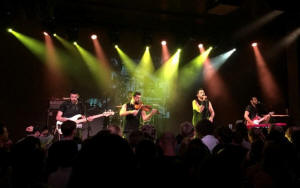|
Lebanese alt-rock band confronts
post-Orlando divisions during U.S. tour
 Send a link to a friend
Send a link to a friend
 [June 14, 2016]
By Yeganeh Torbati [June 14, 2016]
By Yeganeh Torbati
WASHINGTON (Reuters) - Accustomed to
generating controversy in their native Middle East with lyrics tackling
love, sex and political apathy, members of Lebanese alt-rock band
Mashrou' Leila thought a summer U.S. tour would bring them a welcome
respite.
Instead, as news spread on Sunday that an American man claiming
allegiance to Islamic State had killed 49 people in a packed gay
nightclub in Florida, the band found itself at the crossroads of
tensions between the gay and Muslim communities, spilling out on
social media and in online commentary.
Mashrou' Leila has broken ground in the Arab world with an openly
gay lead singer and stances espousing gender equality and sexual
freedom. In doing so, the band embodies the two communities most
shaken by Sunday's shooting - lesbian, gay, bisexual and transgender
people targeted by the Orlando gunman, and Muslims who feel unfairly
blamed for the violence perpetrated in the name of their religion.
"We come from a part of the world where I've always felt not
accepted because of my sexuality," Hamed Sinno, Mashrou' Leila's
lead singer, said in an interview on Monday.
Seeking out information in the hours after the attack, Sinno said he
came across comments on social media that he felt sought to pit
Muslims and gays against each other.
 "By the time they even started getting the names of the victims out,
the media had already spun it as this whole LGBT community versus
Muslim community" phenomenon, he said. "So many of us are at the
intersection of these two communities. Suddenly I felt excluded, I
felt I wasn't allowed to mourn."
Sinno said the band had already experienced several brushes with
anti-Muslim bias in its two weeks in the United States. An airport
security guard told them that if Donald Trump won the presidency,
"all of this is gonna change," apparently referring to the
Republican presidential candidate's pledge to ban Muslims from
entering the country if he is elected.
The band's danceable tunes have earned them an avid global following
but also condemnations from Arab leaders who say their lyrics go
against the region's traditional values. In April, Jordanian
authorities banned the group from the country, band members said,
though they later relented after an international outcry.
One song, "Shim el-Yasmine," describes Sinno's desire to introduce
his male lover to his parents, while "Lil Watan" skewers political
apathy in the Middle East.
[to top of second column] |

Lebanese band Mashrou' Leila with the band's lead singer Hamed Sinno
(2nd R), performs in Washington, DC, U.S. June 13, 2016.
REUTERS/Yeganeh Torbati

It is wrong-headed to blame Sunday's attack on Islam, said Sinno, a
U.S. citizen. The FBI said the Orlando gunman, Omar Mateen, called
during the massacre to pledge allegiance to Islamic State, the
jihadist group that later claimed responsibility for the attack.
But the depth of Mateen's commitment to Islamic State was unclear.
His father said the attack was not motivated by religion and
suggested it was rather his son's anti-gay sentiments.
"The issue is not Islam more than any other religion," Sinno said.
"Most of the attacks that happen against the queer community in the
U.S. are not by Muslims, they're by Christian fanatics."
In front of a sold-out crowd on Monday night at the Hamilton venue
in downtown Washington, D.C., the band briefly addressed the
tragedy, the worst mass shooting in modern American history. Staff
at the Hamilton said they decided to up security measures following
Sunday's attack, and patrons and their bags were carefully screened
before entering the concert.
"There are a bunch of us who are queer, who feel assaulted by that
attack who can't mourn because we're also from Muslim families, and
we exist," Sinno said to cheers from the crowd, before the band
launched into the next song.
(Reporting by Yeganeh Torbati; Editing by Frank McGurty and Cynthia
Osterman)
[© 2016 Thomson Reuters. All rights
reserved.]
Copyright 2016 Reuters. All rights reserved. This material may not be published,
broadcast, rewritten or redistributed.

 |